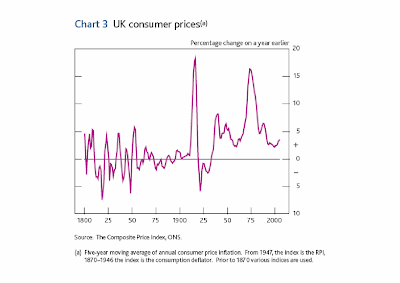 (click on the figure to enlarge)
(click on the figure to enlarge)From the the Bank of England's Quarterly Bulletin Q1 2009:
This article has explained how the economic costs of
deflationary episodes will be largely determined by the
underlying circumstances which have caused prices to fall. If
deflation has occurred because of beneficial supply shocks, the
economic costs may be much less than if deflation has arisen
because of an adverse demand shock.[...]
But this conclusion does not tell us whether the experience of
falling prices, per se, makes the deflationary episode more
costly. The association of the 1930s’ deflationary episode in
the United Kingdom with a deep depression has led many
commentators to demonise deflation, but it is important not
to confuse the effects of the underlying shock (for example a
credit crunch) with the effects of deflation itself.
This article has explained how the economic costs of
deflationary episodes will be largely determined by the
underlying circumstances which have caused prices to fall. If
deflation has occurred because of beneficial supply shocks, the
economic costs may be much less than if deflation has arisen
because of an adverse demand shock.
But this conclusion does not tell us whether the experience of
falling prices, per se, makes the deflationary episode more
costly. The association of the 1930s’ deflationary episode in
the United Kingdom with a deep depression has led many
commentators to demonise deflation, but it is important not
to confuse the effects of the underlying shock (for example a
credit crunch) with the effects of deflation itself.